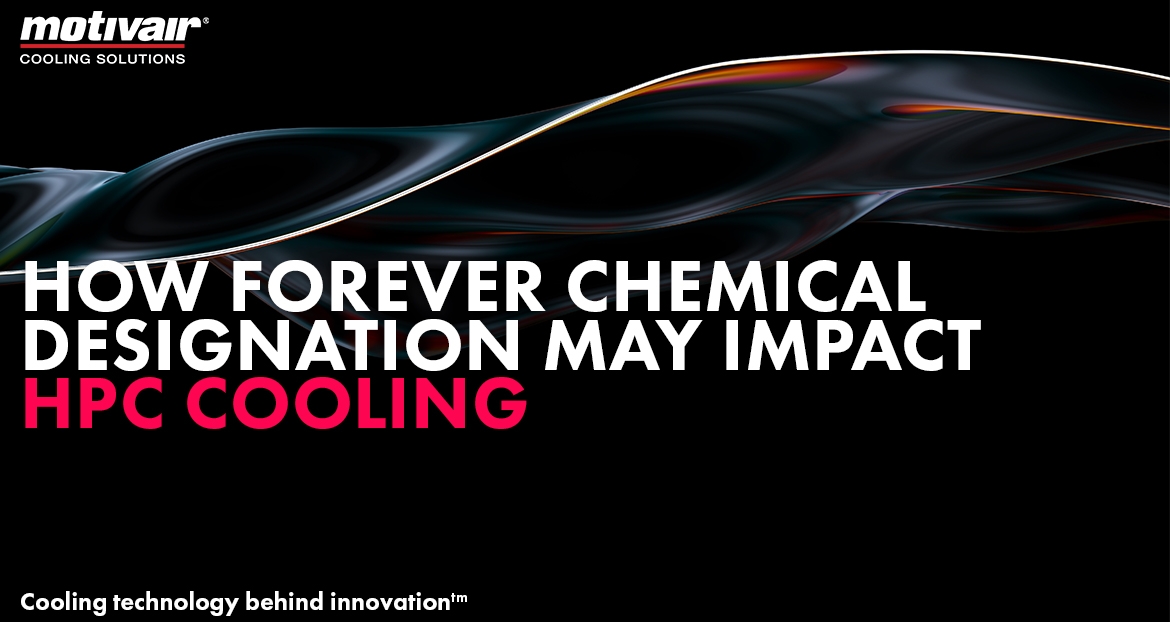Motivair Cool News
January 24th, 2023
How Forever Chemical Designation May Impact HPC Cooling

The EPA’s recent designation of so-called “forever chemicals” will have a significant impact on the IT industry’s ability to leverage two-phase immersion and two-phase cold plate cooling solutions as it looks to manage thermal challenges in higher wattage GPUs and CPUs.
In December, the EPA’s designated polyfluoroalkyl substances, better known as PFAS, as hazardous substances. PFAS have also come under scrutiny in Europe, where some are urging an EU-wide ban on use of the substances.
PFAS, a set of chemicals in common water-proof clothing and non-stick materials, are also prevalent in semiconductor manufacturing, two-phase immersion cooling, and two-phase cold plate cooling applications.
LEARN MORE: Possible Coolant Shortage to Effect Semiconductor Industry
CAN THE HPC INDUSTRY SHIFT FROM HERE TO MEET DEMAND?
Each of these approaches offer their own unique benefits as well as challenges, however the recent EPA announcement presents concerns likely causing early adopters and the IT industry to take pause for three primary reasons:
- The largest consumers of IT equipment with names like Amazon, Google, Microsoft and Meta, to name a few, are committed to self-imposed Environmental, Social and Corporate Governance goals (ESG). For investors and Board of Directors, using PFAS in any form presents unwanted risk and is against the intent of most ESG initiatives.
- Server manufacturers along with the largest consumers of IT equipment operate on a global scale. The EPA’s recent declaration, combined with calls for bans on PFAS inside the European Union, create an unclear view of a two-phase cooling solution that can be deployed globally.
- Until now, 3M has produced the vast majority of PFAS and has recently announced it will stop producing Novec and similar forever chemicals. This creates an immediate risk of obsolescence for technologies using these or similar PFAS fluids.
LEARN MORE: HPCWire coverage on PFAS Regulations, Impact Two-Phase Cooling in HPC
LEARN MORE: Two-phase cooling will be hit by EPA rules and 3M's exit from PFAS "forever chemicals
SINGLE PHASE AND TWO-PHASE COOLING OPTIONS
The rise in computer chip wattages has led to a flurry of advances in thermal technologies designed for removing heat from high-powered servers, such as those being used for Artificial Intelligence (AI) and Exascale Supercomputers.
The most common approach from a physics perspective is either single phase, in which the fluid of choice remains in a liquid form or two-phase, in which the fluid of choice is boiled and then condensed in a repetitive cycle. Immersion cooling and direct liquid cooling are the primary drivers for these applications.
Immersion cooling is available in single phase (using a non-conductive oil) or two-phase (using a dielectric refrigerant like Novec).
Originally driven by Bitcoin farms, immersion cooling made its mark by efficiently removing close to 100% of the heat generated from servers through immersing entire IT assets in specialized tanks filled with dielectric (non-conductive) fluid.
Direct Liquid Cooling is a method which has been used for decades, where fluid is directed through cold plates placed on top of various computer chips to remove heat.
Single-phase cold plate cooling uses a water-based fluid, while two-phase cold plate cooling uses Novec or something similar. Direct Liquid Cooling can typically remove 70% of the heat generated by the IT equipment with the balance being reject to surrounding air.
All of the cooling technologies mentioned here have been deployed successfully and no doubt will find a home within the larger IT ecosystem, however the recent events surrounding two-phase cooling will continue to present challenges to large scale adoption moving forward.
As the IT industry continues to leverage advanced chips for driving innovation and competitive advantage, thermal technologies remain at the center of the ecosystem. Those technologies capable of meeting performance needs, ESG goals, and supply chain continuity will most likely command the most attention moving forward.